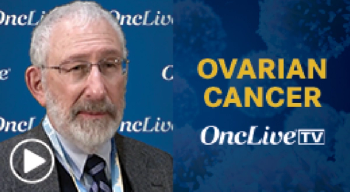
Maurie Markman, MD, discusses the unique role of PARP inhibitors in the treatment of patients with ovarian cancer.

Your AI-Trained Oncology Knowledge Connection!


Maurie Markman, MD, discusses the unique role of PARP inhibitors in the treatment of patients with ovarian cancer.
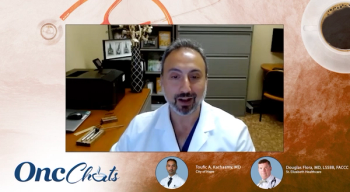
In this fourth episode of OncChats: Assessing the Promise of AI in Oncology, Toufic A. Kachaamy, MD, and Douglas Flora, MD, LSSBB, FACCC, explain the importance of having a diverse editorial board behind a new journal on artificial intelligence in precision oncology.
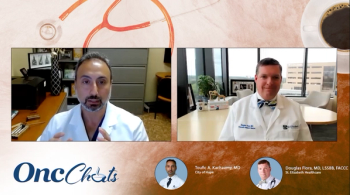
In this third episode of OncChats: Assessing the Promise of AI in Oncology, Toufic A. Kachaamy, MD, and Douglas Flora, MD, LSSBB, FACCC, discuss the launch of a new journal that will focus on educating the field on the latest research efforts being made with artificial intelligence.
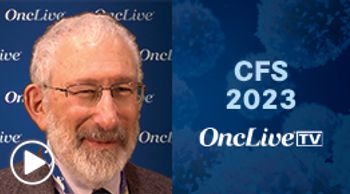
Maurie Markman, MD, discusses the importance of designing clinical trials for patients with ovarian cancer that are based on real-world data and consider the increasing complexity of treatment sequencing in this disease.
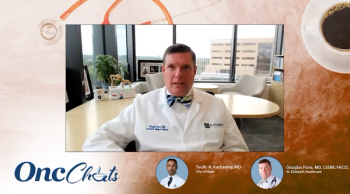
In this second episode of OncChats: Assessing the Promise of AI in Oncology, Toufic A. Kachaamy, MD, and Douglas Flora, MD, LSSBB, FACCC, explain how artificial intelligence tools may be leveraged in the oncology field to provide personalized care.
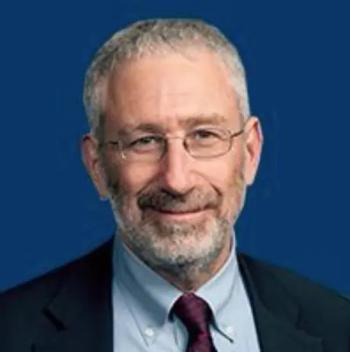
It is time for society to address the critical nature of our current unsustainable oncology pharmaceutical marketplace, and it is also essential that whatever solutions are proposed and implemented do not incorporate inappropriate labeling of outcomes that negate meaningful measures of clinical benefit.
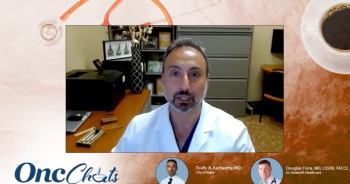
In this first episode of OncChats: Assessing the Promise of AI in Oncology, Toufic A. Kachaamy, MD, and Douglas Flora, MD, LSSBB, FACCC, define artificial intelligence and highlight the goals of these tools in healthcare.

It is difficult to browse a major medical journal these days and not find an article, commentary, or editorial that discusses the objectively rather profound implications for clinical science and health care delivery resulting from simply stunning advances in computer technology in the arena of artificial intelligence.

Maurie Markman, MD, highlights the rather profound fiscal implications of the combined effect of 2 quite different but closely related components of the rapidly evolving cancer treatment paradigm.
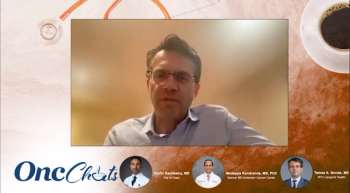
In this final episode of OncChats: Leveraging Endoscopic Ultrasound in Pancreatic Cancer, Toufic A. Kachaamy, MD, Madappa Kundranda, MD, PhD, and Tamas A. Gonda, MD, reiterate that the role of endoscopic therapies in pancreatic cancer continues to evolve.

Tycel Phillips, MD, discusses current and emerging therapeutic treatment strategies for patients with mantle cell lymphoma.
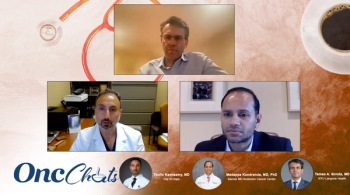
In this sixth episode of OncChats: Leveraging Endoscopic Ultrasound in Pancreatic Cancer, Toufic A. Kachaamy, MD, Madappa Kundranda, MD, PhD, and Tamas A. Gonda, MD, briefly discuss pancreatic cancer ablation and immune modulation.

Treatment with the first-in-class menin inhibitor revumenib generated complete remissions or complete remissions with partial hematological recovery in adult and pediatric patients with relapsed/refractory acute myeloid leukemia or acute lymphoblastic leukemia harboring KMT2A rearrangements.

Overall response rates with bispecific antibody monotherapy in patients with extramedullary relapsed/refractory multiple myeloma were lower than ORRs observed across all patients with relapsed/refractory multiple myeloma included in a systematic review evaluating the efficacy of this class of agents in this difficult-to-treat population.
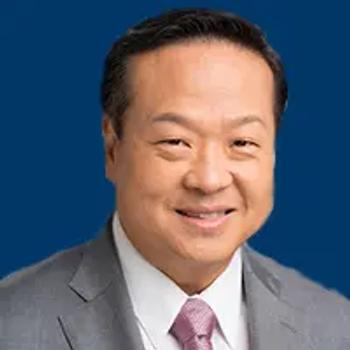
The transformative gift from the Panda Charitable Family Foundation brings together Eastern and Western medicine, advancing research, education and clinical care.
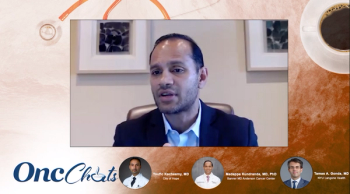
In this fifth episode of OncChats: Leveraging Endoscopic Ultrasound in Pancreatic Cancer, Toufic A. Kachaamy, MD, Madappa Kundranda, MD, PhD, and Tamas A. Gonda, MD, underscore the need for additional research evaluating the role of radiofrequency ablation and other approaches in pancreatic cancer, and avenues that are ripe for further exploration.

Key opinion leaders from across the hematologic oncology realm shared their biggest takeaways from the 2023 SOHO Annual Meeting.
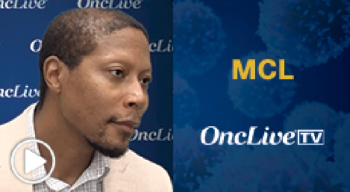
Tycel Phillips, MD, MPH, discusses the use of bispecific antibodies and CAR T-cell therapy across hematologic malignancies, including in patients with mantle cell lymphoma and follicular lymphoma.

Tycel Phillips, MD, MPH, discusses treatment with bispecific antibodies and CAR T-cell therapy in patients with mantle cell lymphoma, and other non-Hodgkin lymphomas.
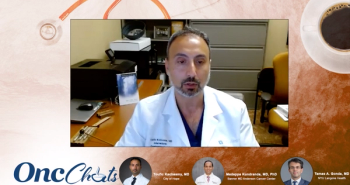
In this fourth episode of OncChats: Leveraging Endoscopic Ultrasound in Pancreatic Cancer, Toufic A. Kachaamy, MD, Madappa Kundranda, MD, PhD, and Tamas A. Gonda, MD, discuss what is known about the utilization of endoscopic radiofrequency ablation in nonmetastatic pancreatic adenocarcinoma and the potential for this approach in the paradigm.

Marwan G. Fakih, MD, expands on long-term findings from the phase 2/3 PROSPECT trial and how these findings may influence the optimal use of nonoperative management strategies in locally advanced rectal cancer.
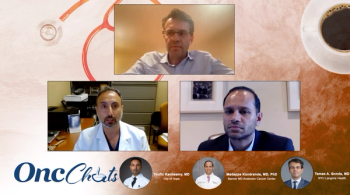
In this third episode of OncChats: Leveraging Endoscopic Ultrasound in Pancreatic Cancer, Toufic A. Kachaamy, MD, Madappa Kundranda, MD, PhD, and Tamas A. Gonda, MD, share how they would best utilize genetic testing results obtained from endoscopic ultrasound–guided biopsies in pancreatic ductal adenocarcinomas.

Daneng Li, MD, highlights the importance of biomarker testing in gastroesophageal and biliary tract cancers, the potential role for targeted therapy in first-line CRC treatment, and when to choose neoadjuvant therapy over upfront surgery and adjuvant therapy in pancreatic cancer.

Daneng Li, MD, discusses the investigation of triplet combination therapy for patients with hepatocellular carcinoma in the phase 1/2 Morpheus-Liver study.

Afsaneh Barzi, MD, PhD, discusses unmet needs associated with the adjuvant treatment of patients with gastroesophageal cancers and highlights the use of nivolumab in this setting.

Daneng Li, MD, discusses how immune-related adverse effects can affect the treatment of patients with gastrointestinal cancer, specifically those with unresectable hepatocellular carcinoma.
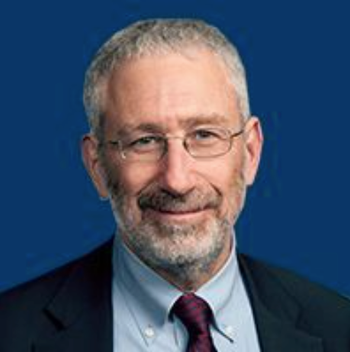
The well-publicized severe shortage of vitally important generic antineoplastic agents has highlighted a serious misalignment in the existing market-based and regulatory environment that permitted such an extraordinary situation to develop without meaningful resolution.

Daneng Li, MD, discusses the evolution of treating patients with HER2-positive colorectal cancer and highlights the effects of implementing HER2-targeted therapy in this patient population.
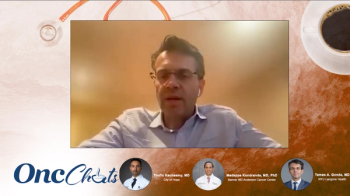
In this second episode of OncChats: Leveraging Endoscopic Ultrasound in Pancreatic Cancer, Toufic A. Kachaamy, MD, Madappa Kundranda, MD, PhD, and Tamas A. Gonda, MD, discuss the techniques used such as endoscopic ultrasound–guided biopsies to collect adequate tissue to perform genomic analyses in pancreatic cancer, and the likelihood for finding actionable mutations in this population.
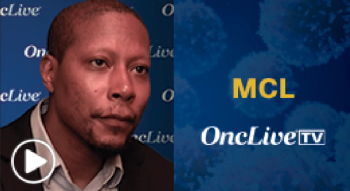
Tycel Phillips, MD, MPH, discusses the ongoing phase 3 ECHO trial of acalabrutinib plus bendamustine and rituximab in the front line for patients with mantle cell lymphoma.